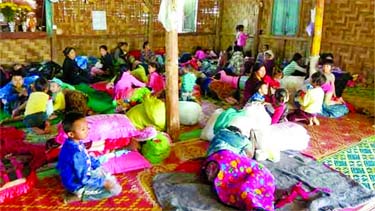
Border Guard Bangladesh (BGB) on Monday pushed back another 114 Myanmar citizens who were trying to cross into Bangladesh through Cox’s Bazar and Bandarban districts.
They were sent back across the zero point at Teknaf and Ghumdum of Nakkhangchharii upazila, BGB officials said.
“We have pushed back more than 80 Rohingya from early Monday to midnight as they were trying to cross over the zero point of Bangladesh-Myanmar river (Naf) boundary,” Major Abu Rasel, Deputy Commander of Teknaf 2 BGB Battalion told The New Nation on Tuesday.
Another 37 were sent back through various points at Ghumdhum in Cox’s Bazar, said Lt Colonel Imran Ullah Sarkar, 34 BGB Battalion Commander.
On November 19, BGB pushed back 125 Rohingyas who tried to cross the border into Bangladesh seeking shelter, as the army began crackdown in the Rakhine state where the Rohingyas, a religious minority in Buddhist Myanmar, have highest concentration.
Nine personnel of the Myanmar Border Police died on October 9 after ‘militants’ attack on three security outposts leading to the army crack down that has killed at least 100 people and displaced some 30,000.
Besides, hundreds have been detained by the military, dozens of women claim to have been sexually assaulted, more than 1,200 houses have been razed and many people have fled for their lives, according to media reports.
The actual number of causalities and the intensity of violence are yet to be ascertained as humanitarian workers and journalists have been banned from the affected areas after the Myanmar (Burmese) army, known locally as the Tatmadaw, carried out what it calls “clearance operations.”
Myanmar’s military and the government, however, rejected allegations. Meanwhile, a large number of Rohingaya people have already entered Bangladesh territory despite ‘high alerts’ on borders along with Myanmar.

Most of the Rohingayas came from Mongdu of Rakhine state and took shelter at Tekhnaf. They have managed to cross over during the late night evading the eyes of the border security forces, reports our correspondent stationed in Cox’s Bazar.
The illegal migrants from Myanmar entered Bangladesh with the help of brokers and took shelter at the refugee camps of Ukhia and Teknaf.
Admitting the sudden influx of people, Abu Siddique, president of Kutupalang Rohingya slump told The New Nation on Tuesday that at least 250 Rohingayas of 35 families came to their slump in the last two days. “They came here in the early morning and took shelter at various rooms of the slump,” he added. “Burmese army set fire on our homes forcing us to flee from Myanmar. We lived in jungle for the last 40 days. We reached the slump on Monday morning crossing the Unchipang border,” Md Hashem, an illegal migrant from Myanmar, told The New Nation on Tuesday.
He said, Rohingya civilians are trying to escape to Bangladesh following the worst-ever bloodshed ensued by the army crackdown that rendered up homeless.
More than 500 Rohingya people entered the camps of the International Organization for Migration (IOM) in the hills near the Bangladesh-Myanmar border on Monday, reported Reuter quoting an unnamed IMO official.
They had recently fled from Myanmar.
The aid workers of international agencies did not give the specific number, but expressed concern about a sudden influx of people, according to the report.
Humanitarian operations that had been providing food, cash, and nutrition to more than 150,000 people have been suspended for more than 40 days. The UN refugee agency called on the Myanmar government for access to allow it to distribute aid. “The idea is to help them where they are, so that they wouldn’t be forced to cross over into Bangladesh,” Vivian Tan, regional public information officer for the United Nations High Commissioner for Refugees, told Reuters Television.
“If they can’t get the assistance where they are then, if they are forced to cross into another country like Bangladesh, we’re really appealing to the Bangladeshi government to honor its long tradition of hospitality and open its borders to these refugees.”

